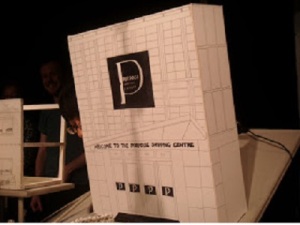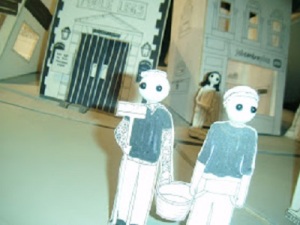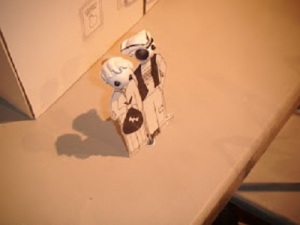By Maddy Costa
In the weeks before I saw Feral in Poole, a voice of suspicion grumbled deep inside me that the project was an unjustifiable extravagance. Feral is a show by a Scottish company, Tortoise in a Nutshell, that was a hit at the Edinburgh fringe in 2013, winning a Fringe First and a Total Theatre award. It tells the story of a humble seaside town destroyed by ineffectual local politics and voracious capitalism, using puppetry to create a live-action film projected on to a screen at the back of the stage. There are two seaside towns participating in NTiYN, so Fuel wondered: what might Feral look like if it were set somewhere not generic but specific? What if, while keeping within the realms of fiction, it reflected a community back to itself?
This is how a chunk of NTiYN money came to be devoted to remaking Feral for Margate and Poole. Fuel funded two week-long research trips, during which members of the company would meet with local councillors and other public figures, chat to shop-owners, wander the streets and get a feel for each place. The set for the show, and a host of peripheral figures, would then be individually remodelled to suggest real-life places and faces in each town. Which is great, except that Feral in Margate was scheduled for only two performances, Feral in Poole just one. Even Ross MacKay, the company’s artistic director, felt that the work and resources were disproportionate to the number of shows.
Was the expenditure of time and money worth it? I can only judge by what I saw in Poole, where even asking the question made me feel kind of ashamed. The Lighthouse Studio was busy and bustling with anticipation; as soon as the company unveiled the centrepiece of the set, a shabby shopping centre named, in honour of Poole’s Dolphin Centre, the Porpoise, people in the audience became audible in their appreciation. There were giggles at shops whose names were slight variations on local High Street landmarks, and snorts of recognition at the exasperation of townspeople stuck at the level crossing. I had my own moment of delight at the appearance of the local councillor: I’d met one with Ross on a day’s visit to the Poole research week, a formidable and dedicated woman who had fought long, tenacious campaigns on behalf of women who had experienced domestic violence and girls subjected to genital mutilation, who startled Ross and myself when she announced that she was inspired to enter politics by the example of her hero, Margaret Thatcher. Sure enough, the tiny puppet councillor of Poole looked nothing like her real-life counterpart – and instead was a miniature model of the Iron Lady, right down to the handbag.
Afterwards I sat down with some of those audience members for a theatre club and played devil’s advocate: did it really make such a difference, Feral being set in Poole? They couldn’t have been more emphatic in their answer: yes, absolutely yes. It wasn’t just the pleasure of seeing the town’s idiosyncrasies (the obsession with pirates, the lack of a local newspaper) noted and incorporated; there was something deeper and more political than that. They experienced in brief and microcosm the destruction of their locale: a place that frustrates them, but that they care for and want to see thrive. In the show, the town is blighted by the introduction of a casino: there’s been talk of that happening here for years, said one woman, and Feral reminded her how vital it was actively to oppose it. Poole can feel quite placid and ineffectual, suggested another woman; it was inspiring to see the community rally around at the end of the story, to see how we look out for each other. For one of the men, it was a strong argument for how much this community needs art: stories and activities that bring the community together, and get them feeling and thinking.
A question that fascinated me was what it would take for the social inequality shoved under the carpet in Poole to spark riots, like those in the show. What might be the tipping point? Many suggested that it would never happen – but that that was no excuse for complacency. One of the people at the theatre club works locally as a producer of live performance and events; for her, Feral in Poole was a call to arms, not to riot, but to create a more active, more vibrant local arts community, one that is inclusive and addresses those social inequalities, that offers free access to art and makes it integral to everyone’s lives.
Questions about value adhere to theatre so vigorously, they come to seem inevitable, natural even: like limpets clinging to rock. But this night in Poole watching Feral speak directly to its audience, and chatting with that audience afterwards, reminded me that the value questions can also be irrelevant. There is a level at which a show that invigorates its audience with a sense of purpose and community spirit is actually priceless. A level at which, injecting money into a touring show to make it not generic but specific shouldn’t be a one-off extravagance but sustainable, standard practice.


